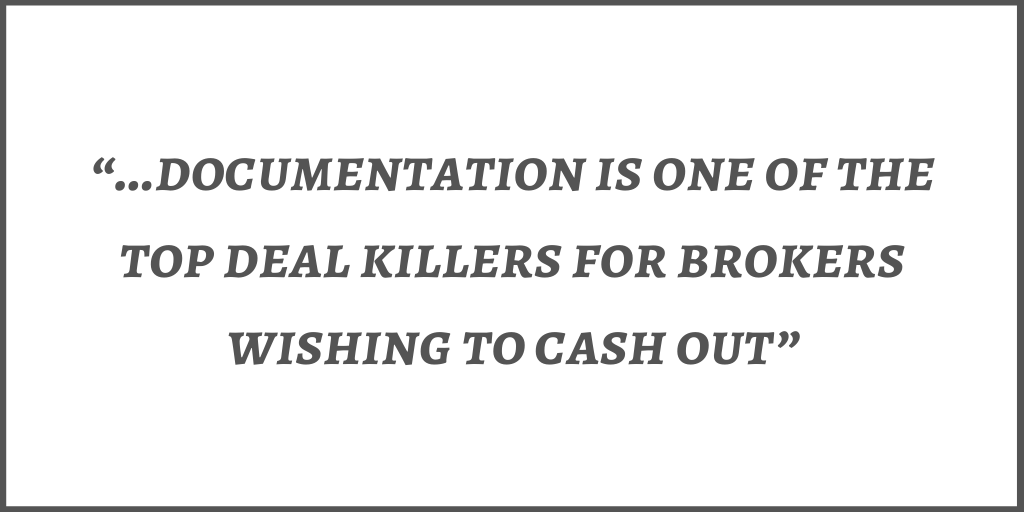There’s a dirty little secret in the world of real estate brokerages that few people talk about. It’s a disturbing trend that we’re seeing more frequently in small and mid-sized firms: Many brokerages today are just not very profitable.
In 35+ years, I’ve looked at 1,000’s of financial statements. What is interesting lately is that even with industry-wide record years where brokers have made a lot of money, when you look at their P&L’s— which often show nice profitable bottom lines— we find the profit in many of today’s brokerages actually comes from the broker’s own personal production.
Since the beginning of the industry, the top agents typically earn more than the broker; it’s the way it is. Except…today’s conditions have changed so much for the broker/owner of all sized firms that there is a real disparity between the incomes of the agents and the broker. Look how things have shifted in recent years:
- Company dollar has dropped by almost 30% just in the past five-years

- Competitive brokerage models are forcing higher agent splits
- Rising expenses have dramatically reduced profits
- Downward pressure on commissions keeps rising
- New technologies and models are designed to undermine brokers
I’ve written often about the actions brokers can take to build company dollar and profits which generally requires a change in brokerage strategy and direction. It also involves an investment into resources that require capital from the broker/owner. Changing direction and making the time and financial commitments into their firm is the path only a few choose to follow.
Instead, many brokers of small and midsized firms today choose to remain producers because it’s worked well for them. They are working with buyers and sellers because they enjoy it and often, they may not actually be making significant money from the brokerage— their profit comes from being an agent.
The issue comes when the owner is ready for a personal change. Perhaps they want to slow down; maybe even cash out by selling or merging their firms and that’s when determining the market value of their brokerage becomes important. The income statements and true profits drive the company’s market value. In reviewing the financials, we often find when the brokers’ commissions are included but shown as profit, once they are adjusted for reality the company’s profits drop or as is often the case, they’re actually losing money.
Several questions are raised in the process of determining true profitability of the owner’s production:
- How are the owner’s commissions shown in the financials?

- Does the owner pay themselves the same split as they would a comparable agent?
- What are true company dollar and profits after adjusting the owner’s compensation?
- What would be the replacement cost for management?
A case study:
We were very interested in acquiring a seemingly profitable southeastern brokerage headed by a dynamic and active broker/owner. However, the financials provided quite a surprise. The firm had the highest company retained dollar and profit ratio in the history of real estate brokerage operations. But… a closer examination revealed the reason for the massive profits was because the owner who was the top producer by a considerable amount had not been paying himself commissions- none, nada, zero. The result was an artificially high company dollar and profit margin that exceeded any I have ever seen. Of course, the owner’s asking price was based on this very high net profit as well.
Once a real-world commission structure was factored in, and earnings adjusted for the unpaid commissions, it became obvious the owner was subsidizing the company with his commissions. In fact, the agents didn’t even cover the overhead and without the owner’s personal financial contribution the company was losing significant revenue. Unfortunately, we were not able to justify the acquisition.
Does this mean the market is bleak for those thinking about selling small-to-midsize brokerages? Not at all, in fact it’s very active as top companies often pay a premium to establish a presence in a market or to increase their existing market share. There are ways to structure the transaction that make sense for all as well. One of the most important steps a broker/owner who is thinking about selling in the near future must do is to invest in good accounting records that clearly document income, expenses and true profitability.
I have found over the years that documentation is one of the top deal killers for brokers wishing to cash out.
This article was written by Rick Ellis, MBA and published in Realty Biz News.
Corcoran International growth now includes the Bahamas

The recent news made by Pamela Liebman, President and CEO of The Corcoran Group, marks another milestone in the firm’s continued expansion and perfectly complements its ever-growing footprint. More international markets to be announced soon. See more.
You made your good name. We can help make it stronger.
Corcoran is growing and we’re looking for a few good firms to grow with. Click here to learn about the Corcoran Network.

Zillow pauses home buying — raising ‘red flags’ about the market.
The company claims that ‘operational capacity constraints’ has caused the hiccup in its home-buying business, but some analysts argue that bigger issues may be afoot. Read more.
Corcoran Expands into Ohio

Corcoran Global Living, an affiliate of The Corcoran Group, is excited to announce its expansion into Columbus, Ohio and surrounding areas in Central Ohio. With its entry into the region, Corcoran Global Living is going “all in” with investments and support to immediately establish several office locations serving consumers throughout Central Ohio. Lean more.
U.S. consumer confidence rebounds; house price growth likely peaked
New home sales jumped 14.0% to a seasonally adjusted annual rate of 800,000 units last month, the highest level since March, the Commerce Department said on Tuesday. Full article here.


